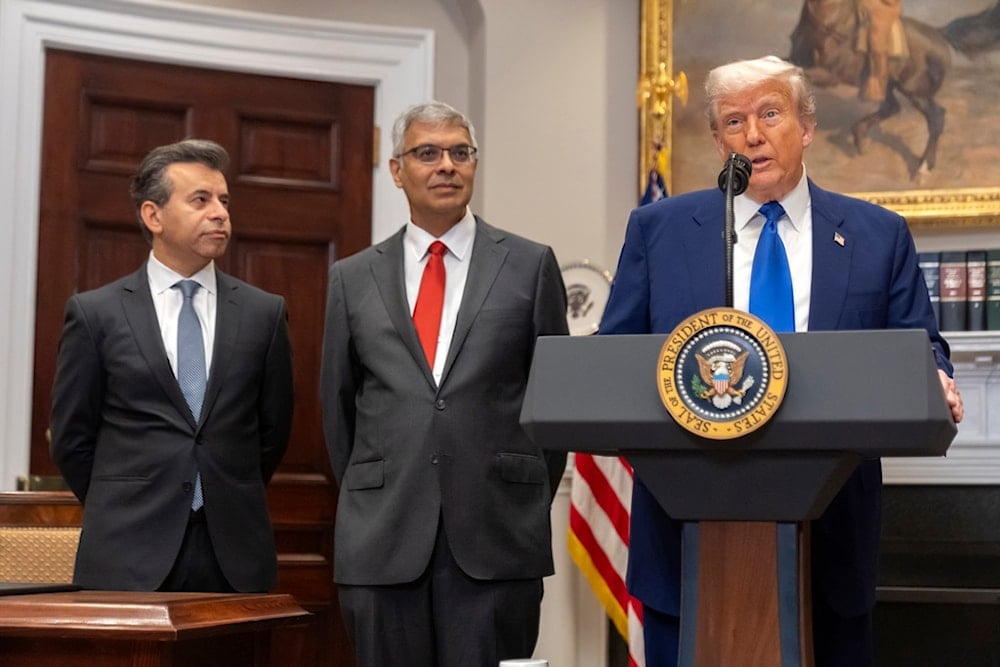Trump prepares for Gulf tour, Gaza talks, and Ukraine summit
A central focus of Trump's trip will be multi-billion-dollar investment agreements aimed at deepening economic cooperation.
-

President Donald Trump, right, speaks as Food and Drug Administration commissioner Martin Markary, left, and Jay Bhattacharya, director of the National Institutes of Health, listen during an event in the Roosevelt Room at the White House, Monday, May 12, 2025, in Washington. (AP Photo/Mark Schiefelbein)
US President Donald Trump announced Monday that he will soon embark on a three-day diplomatic tour of the Middle East, with scheduled visits to Saudi Arabia, Qatar, and the United Arab Emirates (UAE). Speaking to reporters, Trump described the trip as "historic," emphasizing its significance in strengthening regional alliances. "I am about to embark on a historic visit, some of you are joining us, and as I said, I will travel to Saudi Arabia, Qatar, and the United Arab Emirates," he said.
The visit comes as part of broader US efforts to re-engage with key Gulf partners, who have increasingly linked normalization with "Israel" to concrete steps toward establishing an independent Palestinian state.
Major investment deals on the table
A central focus of Trump's trip will be multi-billion-dollar investment agreements aimed at deepening economic cooperation. Saudi Arabia is expected to unveil a $600 billion investment package in the US over the next four years, while the UAE has pledged $1.4 trillion over the next decade, targeting infrastructure, energy, and technology sectors.
Qatar is also preparing to announce major deals, including a significant commercial aircraft purchase from Boeing and a $2 billion contract for MQ-9 Reaper drones, signaling Doha's growing defense partnership with Washington.
Read more: Trump eyes Gulf billions, but war on Gaza blocking normalization: FT
Alexander's release imminent
Trump confirmed that US-Israeli captive Edan Alexander, held by Hamas in Gaza since October 2023, will be released within hours. The breakthrough follows direct negotiations between the United States and Hamas, mediated by Qatar and Egypt. Unlike prior efforts led by Israeli authorities, Washington took the lead in these talks, sidelining Israeli officials amid frustrations over stalled ceasefire negotiations.
"I am grateful to all those involved in making this monumental news happen," Trump wrote on social media. "Hopefully this is the first of those final steps necessary to end this brutal conflict."
Israeli Army Radio reported preparations to receive Alexander after his release, stating: "The army is preparing to receive captive Edan Alexander starting from 6:30 PM in the Khan Younis area."
The development has sparked criticism within "Israel", with opposition figures accusing Prime Minister Benjamin Netanyahu's government of lacking initiative in securing Alexander's release.
Read more: 'Do not leave anyone behind': Israelis enraged, call for protests
Focus on Ukraine and South Asia
Beyond the Middle East, Trump addressed the conflict in Eastern Europe, highlighting an upcoming high-level meeting with Russian and Ukrainian officials. "Thursday's meeting with Russia and Ukraine is very important. I was very insistent that that meeting take place. I think good things can come out of that meeting," he said.
The summit follows weeks of US-led backchannel diplomacy, with European and Turkish mediators facilitating dialogue. Ukrainian President Volodymyr Zelensky has agreed to participate, contingent on the enforcement of a ceasefire starting May 12. European leaders have pledged additional sanctions on Russia if Moscow fails to de-escalate hostilities.
In South Asia, Trump disclosed he had delivered a firm ultimatum to India and Pakistan, threatening to suspend trade relations unless both nations moved swiftly to de-escalate their border conflict, particularly in the volatile Kashmir region.
Read more: Kashmir civilians return home as ceasefire brings uneasy calm
Syria sanctions and regional diplomacy
Trump also revealed that Turkish President Recep Tayyip Erdogan had requested the US consider lifting sanctions on Syria to allow for a "fresh start." While no formal decision has been made, Trump signaled openness to the request, framing it within broader regional stabilization efforts.
In parallel, Syria's post-Assad leadership has reportedly offered US companies access to natural resource projects and expressed interest in joining the Abraham Accords. These overtures are reshaping Washington's diplomatic calculations as it weighs engagement against long-standing isolation policies.
Read more: Syria's leadership engage 'Israel', receive threats via Azeri official
US-China trade reset and EU criticism
Turning to US-China relations, Trump confirmed a temporary reset following months of escalating trade tensions. After marathon negotiations in Geneva, the two sides agreed to reduce reciprocal tariffs and implement a 90-day pause on new trade measures.
"I will speak to President Xi maybe at the end of the week," Trump said, hailing the Geneva talks as a "great deal." While ruling out an immediate return to 145% tariffs, he warned that duties would increase "substantially higher" if no lasting agreement is reached.
Trump also took aim at the European Union, labeling it a tougher trade adversary than China. "European Union is in many ways nastier than China, okay, and we've just started with them. They'll come down a lot. You watch. We have all the cards," he stated.
Highlighting trade imbalances, Trump added, "They sell us 13 million cars. We sell them none. They sell us their agricultural products. We sell them virtually none. They don't take our products. That gives us all the cards, and [it's] very unfair so they're going to have to pay more for health care, and we're going to have to pay less."

 5 Min Read
5 Min Read









